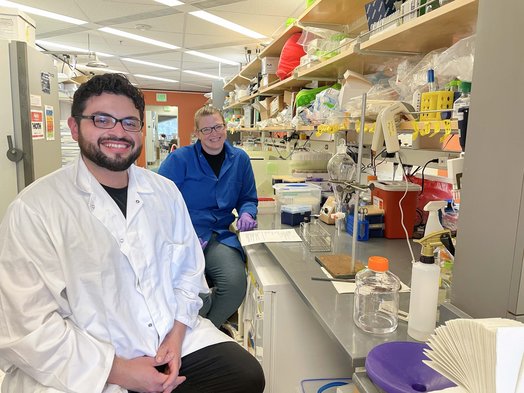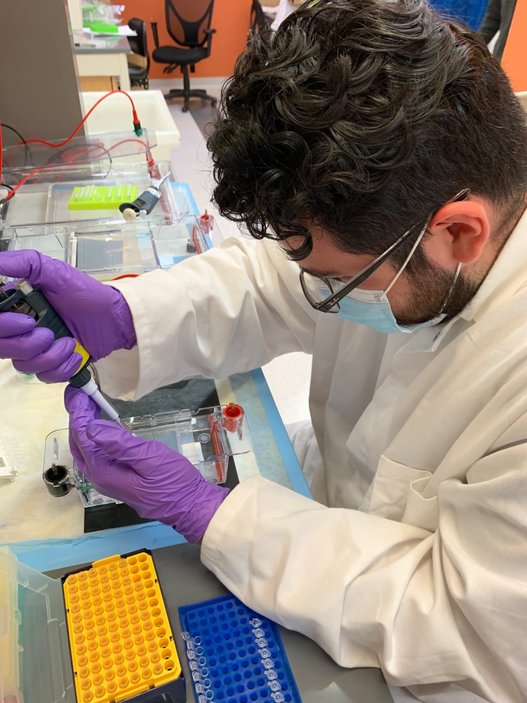BUILDing Future Researchers
By Melissa Simon
Watch Lorenzo Ramirez's interview on YouTube (click above).
Ramirez's is the fourth in our "BUILDing Future Researchers" series highlighting BUILD scholars who graduated in the Class of 2022.
For as long as Lorenzo Ramirez can remember, his dream has always been to become a scientist who changes the world.
Ramirez, a senior studying chemistry at San Francisco State University (SFSU), said when other kids his age were outside playing in his hometown of East Los Angeles, California, he was inside watching “Bill Nye the Science Guy,” a TV show hosted by a mechanical engineer who taught children about science.
He said he sometimes felt alienated because nobody he knew watched “Bill Nye,” but his curiosity to learn about how the world worked kept him tuning in to the show.
“I remember learning about friction and . . . my parents told me I used to come up to them and be like, ‘Look, friction’ and rub my hands together,” Ramirez said, adding that the more he watched the show, the more questions he had about how things worked. “It made me really curious as a kid and I really wanted to become a scientist [because of it].”
But Ramirez’s journey into research wasn’t always a straightforward one.
After graduating high school, he went to Pasadena City College and lost focus on his goals of becoming a researcher. Ramirez said he took some time off but, after listening to a recent podcast about research, he rediscovered his passion for science, in particular studying microbiomes.
Through conversations with a close friend, Ramirez learned about SFSU’s BUILD program and decided to join.

“When I went back to school [in 2021], that’s when I was like, ‘I’m going to be a scientist. I don’t know how, but I’m going to make it work,’” said Ramirez, who graduates this fall with a bachelor’s in chemistry.
Being part of BUILD has helped Ramirez not only feel like a student again, but also find his place in the scientific community. He said he’s also grateful to his peers who challenge him to see things in new ways.
The idea of giving back to his community is part of what inspires Ramirez to push forward with his research.
He hopes his journey as a non-traditional student will one day be an inspiration to others, especially for those who grow up in communities that are underserved, or that may be lacking in resources or role models for children to look up to. For Ramirez, he can’t remember one person from his hometown that was a researcher nor any former classmates that have gone into science.
“I wanted to meet people like me [but] I didn’t . . . and I want to be somebody who inspires people from my community to show [them] that you can do this, you can do more,” he said. “It’s possible [so] don’t be scared and don’t doubt yourself.”
The best remedy to overcome any doubts, he said, is to not compare yourself to others who have more experience. Ramirez said everyone starts at the same place and has to learn.
“I just remind myself this is what I love and I’m going to keep doing it, I’m going to keep growing [and] I will get better at it over time as long as I keep with it,” he said.
That desire to keep working at your passion is one of the pieces of advice he’d give to others interested in becoming a researcher.
In the words of one of Ramirez’s organic chemistry professors: “You have to find the thing that lights you up, the thing that keeps you up into the middle of the night.”
When asked how he’s grown as a scientist, Ramirez recalled a conversation with Leticia Márquez-Magaña, PhD, about competition vs. collaboration. Márquez-Magaña is the SF BUILD Lead Principal Investigator and Institutional Development Core.
She told him that when people collaborate, they are able to uplift each other and push forward more than if they were competing, Ramirez said. Collaboration is important because it helps promote inclusivity, especially in science when data doesn’t always represent everyone.
“BUILD really opened my eyes to how we can improve research through collaboration and being inclusive . . . doing ethical science and making sure we also give back,” he said.
Science is hard and there’s a lot of critical thinking involved, but don’t give up because there’s always new research going on, Ramirez said.
“Then, as you get farther along, find the part of science that really lights you up and then follow that,” he said.
For Ramirez, that work entails his current position working with Margaret Alexander, PhD, a postdoctoral scholar at University of California San Francisco (UCSF), at the Turnbaugh Lab researching the relationship between diet and pharmacology in relation to human gut microbiota.
After he graduates in the fall, Ramirez hopes to continue his research on T cell activation and human gut microbiota while pursuing either an MD or MD/PhD program.
“I’m still working out exactly what I want to do . . . but whatever I do, I want to be able to impact the lives of people [and] improve the knowledge and awareness of science,” Ramirez said.

Note: Lorenzo Ramirez’s story is the fourth in a series called “BUILDing Future Researchers: 2022 Graduates Share Their Stories,” about recent BUILD graduates. Read all the stories from the series here in the DPC Newsletter Volume 7, Issue 3.
Recent News
The Diversity Program Consortium Coordination and Evaluation Center at UCLA is supported by Office of the Director of the National Institutes of Health / National Institutes of General Medical Sciences under award number U54GM119024.

Grow Together.